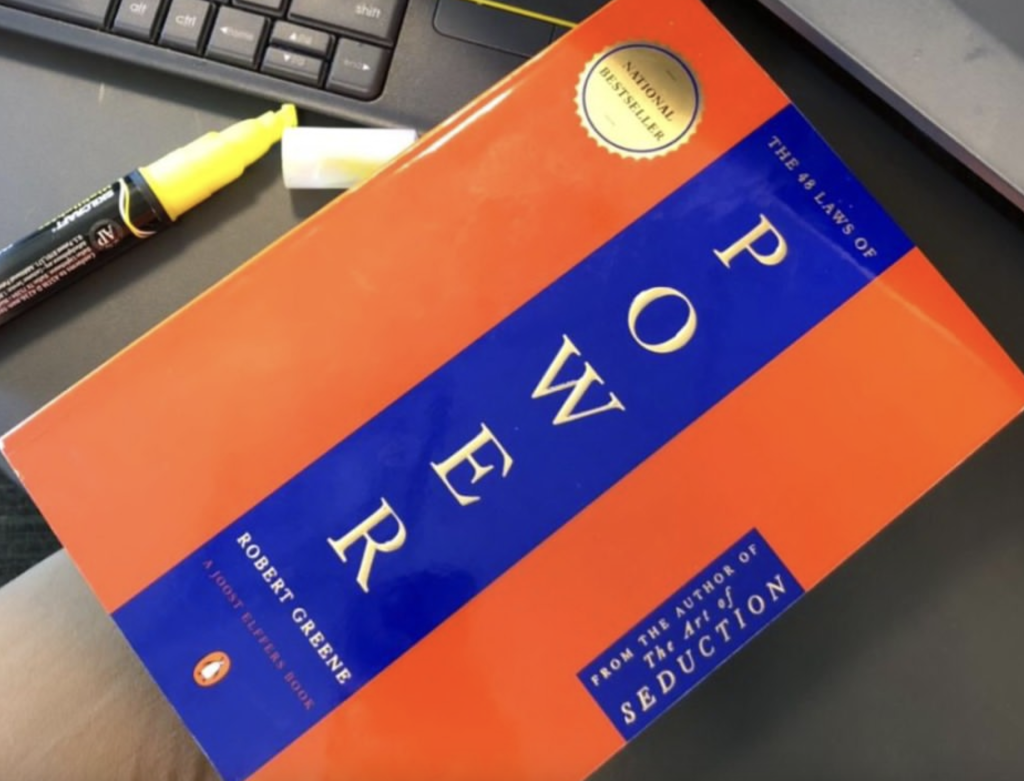
An Analysis of Robert Greene’s Laws 12, 13, 24 and 44 from The 48 Laws of Power
He winketh with his eyes, he speaketh with his feet, he teacheth with his fingers. Proverbs 6:13
Generosity is often romanticized as pure selflessness, a noble act of goodwill. But let’s be real—true altruism is rare. As Robert Greene masterfully dissects in The 48 Laws of Power, generosity is often a calculated move, a tool wielded by the shrewd to manipulate, control, and gain leverage. Beneath every grand gesture and seemingly selfless act, there’s usually an agenda—a power play disguised as kindness. Those who fail to recognize this reality risk becoming pawns in someone else’s game.
This isn’t just another self-help guide—it’s a wake-up call. We’re breaking down how to spot the hidden agendas lurking behind so-called generosity, using sharp insights from The 48 Laws of Power. Power plays are everywhere, disguised as kindness. By mastering the art of reading between the lines, you’ll shield yourself from manipulation and navigate relationships with unshakable awareness and control.

The Illusion of Selflessness
At first glance, generosity appears to be an act of selflessness. However, as Greene reminds us, power dynamics are often at work even in the most seemingly altruistic gestures. Here’s why:
1. Generosity as a Tool for Influence
Generosity can be a powerful tool for gaining influence and control. When someone gives you something—whether it’s a gift, a favor, or assistance—they create a sense of indebtedness. This indebtedness can be leveraged later to gain compliance or loyalty.
Law 12: Use Selective Honesty and Generosity to Disarm Your Victim
Greene advises using generosity strategically to disarm others and win their trust. By appearing selfless, you can lower their defenses and make them more susceptible to your influence. For instance, a colleague eagerly offers to help with your project, seemingly out of goodwill. But later, that “favor” turns into leverage—they expect you to support their ideas, overlook their mistakes, or return the favor on their terms. What seemed like generosity was really a calculated move to put you in their debt.
2. The Expectation of Reciprocity
Generosity often comes with an unspoken expectation of reciprocity. Even if the giver doesn’t explicitly ask for something in return, the act of giving creates a social obligation. This is a subtle form of manipulation that can be used to control or influence behavior.
Law 13: When Asking for Help, Appeal to People’s Self-Interest
Greene emphasizes the importance of appealing to others’ self-interest when seeking their help. Similarly, those who offer generosity may be appealing to your sense of obligation to serve their own interests. For example, a friend surprises you with an expensive gift, making you feel special and appreciated. But later, they ask for a significant favor—one that puts you in an uncomfortable position. Suddenly, saying no feels impossible without guilt weighing you down. That gift wasn’t just generosity—it was a strategic move to make you feel obligated.
How to Spot Hidden Agendas in Generosity
Recognizing hidden agendas in generosity requires a keen eye and a healthy dose of skepticism. Here are some signs to watch for:
1. The Timing of the Gesture
Generosity that comes at a suspiciously convenient time may have ulterior motives. For example, someone might offer help or gifts just before asking for a favor or when they need something from you. For instance, a coworker suddenly offers to buy you lunch, only to ask for your support in a meeting later that day.
2. Over-the-Top Generosity
When someone goes out of their way to be excessively generous, it’s worth questioning their motives. Over-the-top gestures can be a way to create a sense of indebtedness or to distract from their true intentions. Take, for example, a new acquaintance who showers you with expensive gifts and favors, only to later request a large loan or a significant commitment.
3. Conditional Generosity
Generosity that comes with strings attached is a clear sign of a hidden agenda. If someone makes their help or gifts contingent on your compliance with their wishes, they’re likely using generosity as a tool for control. A manager may, for instance, offer to mentor you, but only on the condition that you take on additional responsibilities without extra pay.
4. Sudden Changes in Behavior
A distant relative who has never shown much interest in you suddenly starts sending gifts and offering financial assistance, only to later ask for a favor involving your connections or resources. If someone who has never been particularly generous suddenly starts offering help or gifts, it’s worth considering why. Sudden changes in behavior can indicate that they have a specific goal in mind.
The Psychology Behind Hidden Agendas
Understanding the psychology behind hidden agendas can help you spot them more easily. Here are some key principles to keep in mind:
1. The Power of Indebtedness
Generosity creates a sense of indebtedness, which can be a powerful tool for manipulation. When someone does something for you, you’re more likely to feel obligated to return the favor, even if it’s not in your best interest.
Law 44: Disarm and Infuriate with the Mirror Effect
Greene suggests mirroring others’ behavior to gain their trust and lower their defenses. Similarly, those who use generosity as a tool may be mirroring your needs or desires to create a sense of connection and obligation.
2. The Illusion of Altruism
People often use generosity to create the illusion of altruism, masking their true intentions. By appearing selfless, they can gain your trust and make it easier to manipulate you.
Law 24: Play the Perfect Courtier
Greene advises mastering the art of flattery and generosity to win favor and influence. Those who use generosity strategically may be playing the role of the perfect courtier, using charm and kindness to achieve their goals.
How to Protect Yourself from Hidden Agendas
While it’s important to appreciate genuine acts of kindness, it’s equally important to protect yourself from those who use generosity as a tool for manipulation. Here’s how:
1. Be Skeptical of Overly Generous Offers
If someone’s generosity seems too good to be true, it probably is. Take a moment to consider their motives before accepting their offer. If a colleague offers to do your work for you, ask yourself why they’re being so accommodating. Are they trying to gain your trust or create a sense of indebtedness?
2. Set Clear Boundaries
Don’t be afraid to set boundaries when someone’s generosity feels conditional or manipulative. Politely decline offers that come with strings attached. If a friend offers to help you move but later asks for a significant favor in return, make it clear that you appreciate their help but won’t be pressured into anything.
3. Observe Patterns of Behavior
Pay attention to patterns in someone’s behavior. If their generosity is inconsistent or seems tied to specific goals, it may be a sign of a hidden agenda. If a family member only offers help when they need something from you, it’s worth questioning their motives.
4. Trust Your Instincts
If something feels off about a generous gesture, trust your instincts. Your intuition can often pick up on subtle cues that your conscious mind might miss. If a new acquaintance’s generosity makes you feel uncomfortable or uneasy, take a step back and evaluate the situation.
Instances of Hidden Agendas in Generosity
Here are a few examples of how hidden agendas in generosity can play out in real life:
- Corporate Gifts: Companies often give free products or services to influencers or potential clients, creating a sense of obligation that can be leveraged later.
- Political Favors: Politicians may offer grants or assistance to communities or individuals in exchange for votes or support.
- Personal Relationships: A romantic partner might shower you with gifts and attention, only to later use this generosity to manipulate or control you.
Conclusion
Generosity is a powerful weapon—one that can uplift or ensnare. Not every act of kindness is pure; many come with strings attached, subtle obligations disguised as goodwill. As Robert Greene warns in The 48 Laws of Power, appearances are often deceptive, and those who fail to recognize the hidden motives behind generosity risk becoming pawns in someone else’s game.
The next time someone extends an unexpected favor, pause. Ask yourself: Is this a sincere act of kindness, or a calculated move? By staying sharp, questioning intentions, and trusting your instincts, you can avoid being manipulated. And more importantly, you can ensure that when you choose to be generous, it’s on your own terms—not as part of someone else’s strategy.
- The Death of Fish Magnet and Why Kidnapping Continues to Thrive in Nigeria - August 2, 2025
- The Fall of Intelligence - July 10, 2025
- UK to Tighten Visa Rules for Nigerians and Pakistanis Due to Overstaying Concerns - May 7, 2025
Discover more from TruthPost
Subscribe to get the latest posts sent to your email.








I think this post does a great job of reminding us that not everything we see as kind is actually motivated by selflessness. The idea of generosity as a power move makes me rethink a lot of my past experiences.